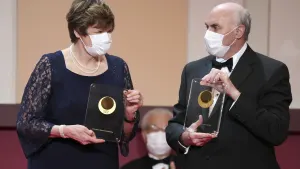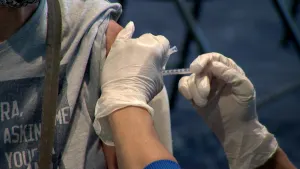More Stories
Connecticut has been under a COVID public health emergency for 1,156 days, but that ends on Thursday.
Gov. Ned Lamont made the announcement at Yale New Haven Hospital, which has treated 36,000 patients since the pandemic began.
“Tomorrow, the official emergency is declared over,” he told a crowd of health care workers.
The move comes as the White House ends the national COVID emergency. With consistently low death rates and high vaccination numbers, health experts said it’s time.
“We will have these new variants, but they're going to be – they may be highly transmissible, but they're going to be less virulent, “ said Dr. Albert Ko with Yale School of Public Health, who served as a key advisor on the state’s reopening plan in 2020.
INDIVIDUAL IMPACT
So, what does it mean for you?
“All the free testing and such is going to wind down over the course of the next three or four weeks,” said Lamont.
Testing sites and mobile vaccination clinics will end on June 30, according to the Connecticut Department of Public Health. It also means that you and your health insurance will soon have to pay for testing and vaccines.
“COVID IS STILL WITH US”
Despite the emergency ending, health officials are warning people to keep their guard up.
“I will remind everyone that COVID is still with us,” said Dr. Deidre Gifford, the state’s Department of Social Services commissioner.
But Gifford said Connecticut is much better prepared now. In 2020, nursing homes were hit especially hard. Some workers even used trash bags as protective gear. But today, the state has a stockpile of 42 million gloves, masks, and test kits – and nursing homes operate under stricter protocols.
“Hundreds of hours invested in training the long-term care industry on infection prevention,” Gifford said.
The state has also spent $165 million on ventilation upgrades at schools, an amount that will nearly double soon.
“Is there the possibility that there will be a curve ball? That is possible,” said Dr. Manisha Juthani, the state Public Health commissioner. “What we're going to need to be able to do is, be prepared to be able to deal with that. Our PPE stockpile is one measure of that.”
Juthani said even if you've had the new Omicron booster, you'll probably need another one this fall. She estimates the vaccine will become a yearly event, likely combined with a flu shot.
EMERGENCY LASTED THREE YEARS
Emergency declarations gave Lamont sweeping powers to close businesses and schools and alter state laws through dozens of executive orders. He relinquished most of that power more than a year ago.
That wasn’t soon enough for some protesters, who held several rallies at the state Capitol.
“I'm here to stop King Ned,” Bill Guiffredo of Naugatuck told News 12 in July 2021. “I think he's tyrannical in what he's doing.”
Lamont said he used his powers judiciously and that the proof is in Connecticut’s high vaccination rates and quick reopening of schools and restaurants.
“I understand. It got a little, you know, edgy there at the end, when people said, ‘Enough,’” said Lamont. “But overall, the state of Connecticut led, and led well.”
More from News 12

Hometown Heroes in Connecticut

Nobel in medicine goes to 2 scientists whose work enabled creation of mRNA vaccines against COVID-19
0:29

Connecticut health commissioner fired during COVID settles with state; dismissal now a resignation
0:21

Biden administration announces $600M to produce COVID tests and will reopen website to order them
2:00

Should you get a COVID booster? Hartford Healthcare doctor says wait
0:22
